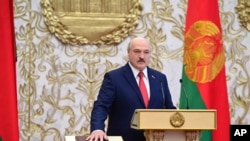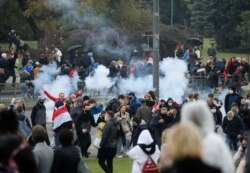Germany is calling for European Union sanctions on Belarus President Alexander Lukashenko.
Speaking to reporters ahead of a meeting of EU foreign policy chiefs in Luxemburg, German Foreign Minister Heiko Maas said that renewed violence against protesters in Minsk could not be ignored.
"The violence continues, perpetrated by the Lukashenko regime - there are still arrests of peaceful demonstrators, so we have to consider how to proceed," Maas, whose country holds the EU's rotating presidency, said.
"I have suggested that we establish a new package of sanctions. And Lukashenko should be among the people who will then be sanctioned," Maas said.
The EU has imposed travel bans and asset freezes on 40 Lukashenko allies, but held back from including Lukashenko in the list.
Dozens of protesters in Belarus were arrested Sunday during the 10th straight weekend of demonstrations against Lukashenko.
Since the president claimed victory in a disputed August 9 election, protesters have regularly taken to the streets demanding his resignation and the release of political prisoners.
Videos from the latest demonstration show security forces using water cannon and batons to disperse crowds. Minsk police said they detained “several dozen” people.
The clashes followed an unusual meeting between Lukashenko and jailed opposition leaders Saturday.
“The goal of the president was to hear everyone's opinion,” his office said of the visit.
Lukashenko’s main opposition candidate in the election, Sviatlana Tsikhanouskaya, is now based in Lithuania after fleeing Belarus for her safety.
Lukashenko maintains he won the poll in a landslide — garnering 80% of all ballots — despite widespread claims at home and abroad the vote was heavily rigged to keep him in power. He has been in office for 26 years.
Public anger has grown over the crackdown in the wake of the protests that have seen more than 7,500 arrests and police violence against demonstrators.
Hundreds have emerged from police custody with bruises and tales of torture at the hands of Lukashenko’s security agents.
Lukashenko has said the protests are encouraged and supported by the West and accused NATO of moving forces near Belarusian borders. The alliance has denied the accusations.






